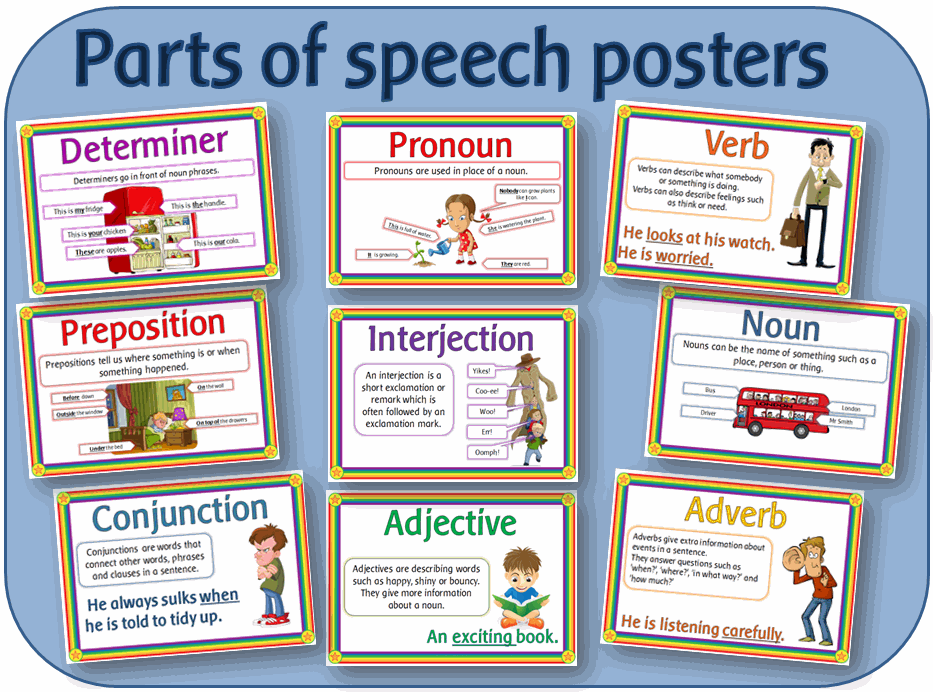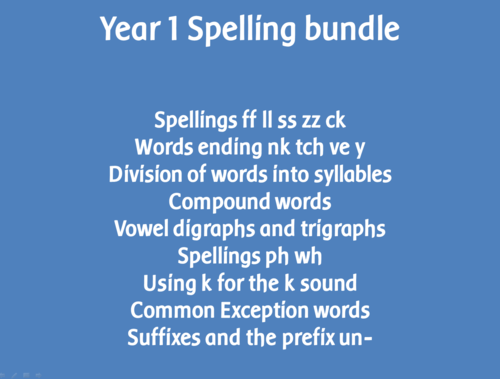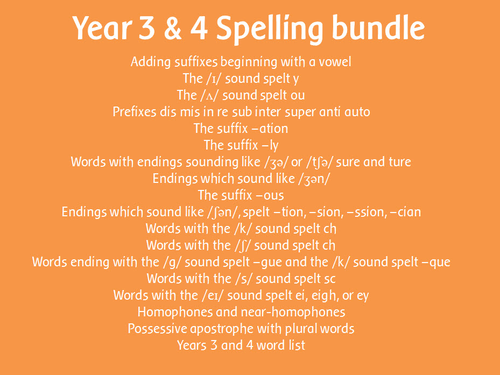
404Uploads
1070k+Views
682k+Downloads
Languages

SPaG Year 5 & 6 Spelling: Word endings that sound like /ʃəs/ spelt –cious or –tious
Resources to teach the spelling guidelines for endings which sound like /ʃəs/ spelt cious or tious
POWERPOINTS:
Shus endings spelt cious: Powerpoint explaining the rules If the root word ends in –ce, the /ʃ/ sound is usually spelt as c. It ends with a look, write cover check interactive activity.
Shus endings spelt tious: Explains the guideline If you can think of a noun from the same root word that ends in –tion, then the /ʃ/ (sh) sound is usually spelt as t. It ends with a look, write cover check interactive activity.
PDF (PRINTABLE) RESOURCES:
Look Write Cover Check cious words: For spelling practice
Anagrams ending cious worksheet
Look Write Cover Check tious words: For spelling practice
Anagrams ending cious worksheet
cious and tious wordsearch
Word list

SPaG Year 4 Terminology powerpoint
A powerpoint explaining the terminology for pupils in Y4 - determiner,pronoun, possesive pronoun and adverbial.

SPaG Year 4 Punctuation: Apostrophes to mark plural possession lesson, activity and display
A powerpoint lesson and worksheet to explain who apostrophes mark plural possession.
POWERPOINT:
Possessive apostrophes with plural words: Explains what they are and how they are used. Ends with an activity to rewrite phrases using possessive apostrophes.
PDF ACTIVITY:
Possessive apostrophes with plural words: Similar activity to the PowerPoint above.
DISPLAY
Plural possessive apostrophes posters

SPaG Year 5 & 6 Spelling: Adding suffixes beginning with vowel letters to words ending in –fer
Resources to teach the spelling guidelines for adding suffixes beginning with vowel letters to words ending in fer
POWERPOINT
Adding vowel suffixes to words ending fer: Explains the rule then gives the children opportunity to write the words applying the spelling rule.
PDF (PRINTABLE) RESOURCES
Complete the fer matrix worksheet
Word list

SPaG Year 5 & 6 Spelling: Word endings able, ably, ible and ibly
A pack of resources to teach the spelling guidelines for Words ending in able, ably,ible and ibly
POWERPOINTS
able word endings
ible word endings
PDF (PRINTABLE) RESOURCES
Look Write Cover Check able ably words
Look Write Cover Check ible ibly words
Word cards - able endings
Word cards - ible endings
Wordsearch - able and ible words
Word endings ible or able worksheet x 2
Word lists

SPaG Year 5 & 6 Spelling: Words containing the letter-string ough
A set of resources ( 1 powerpoint lesson, 6 printable files) to teach about the many different words with the ough spelling.

Vocabulary, grammar and punctuation school assessment Years 1 - 6
A set of materials to assess Appendix 2 for Years 1 to 6 in the English curriculum 2014. It contains a booklet for individual assessment and also class recording sheets.

SPaG Year 6 Word Grammar: Formal and informal vocabulary
A powerpoint lesson and worksheet to teach the difference between vocabulary typical of informal speech and vocabulary appropriate for formal speech and writing.

SPaG Year 6 Sentence Grammar: Use of the passive
POWERPOINT: Explanation of active and passive sentences and how to arrange an active sentence to make it passive. Explains how and when passive sentences can be used
PRINTABLE FILES (PDF): Passive sentences worksheet: Change the active sentences into passive sentences

SPaG Year 6 Terminology powerpoint
A powerpoint explaining the terminology for pupils in Y6: subject, object, active, passive, synonym, antonym
ellipsis, hyphen, colon, semi-colon and bullet points.

Parts of Speech Posters; SPaG, Grammar display
A set of 9 A4 posters plus A4 title and large banner.
The posters describe, name and give examples of each word class.
The posters cover the main 8 parts of speech, plus ‘determiners’ which is often included as the ninth part of speech.
The titles of the posters are:
Adjective
Adverb
Conjunction
Interjection
Noun
Preposition
Pronoun
Verb
Determiner
There are also blank versions to laminate and use for word walls, vocabulary collections etc.
Bundle

Year 1 SPaG: Spelling bumper pack
This pack contains resources to teach all the objectives in the Year 1 Spelling appendix. It includes powerpoint lessons, worksheets, activities and outline plans.

Grapheme pack: ee words
This pack contains 7 resources: A PowerPoint lesson for children to write words containing the new grapheme, 4 differentiated worksheets, picture and word cards and a large flashcard.
The font used is Sassoon with an additional copy in Elementary font.

SPaG Year 5 & 6 Spelling: Word list resouces
A set of resources to teach the spellings of words in the years 5 and 6 word list.
INTRODUCTORY POWERPOINTS
All about words: Introduces the history of the English spelling system and why some words are difficult to spell.
Spelling strategies: Looks at different ways to learn spellings for children to use.
12 SPELLING POWERPOINTS:
The words are organised into 12 different categories, according to how they are spelt. Each category contains between 7 and 9 words so that they can also be used for spelling tests.
Each category contains a PowerPoint with a page for each word and a range of strategies to help remember the spelling of each. The strategies include:
Looking at the history of the word
Looking at words in the same word family
Looking at spelling rules
Looking at root words and affixes
Using speak and spell
Highlighting unusual spelling
Mnemonics
Looking at words within the word
Looking at words with similar spelling patterns
The categories are as follows:
Words with doubles c and m
Words with doubles g, l and p
Words with doubles r, s and t
IE words
Words containing u
Words with affixes 1
Words with affixes 2
Words with unsounded vowels 1
Words with unsounded vowels 2
Words with unsounded vowels 3
Words with unusual Grapheme-Phoneme Correspondence 1
Words with unusual Grapheme-Phoneme Correspondence 2

SPaG Year 5 Sentence Grammar: Relative clauses beginning with who, which, etc
A set of Y5 resources to teach about relative clauses beginning with who, which, where, when, whose, that, or an omitted relative pronoun
POWERPOINTS:
Relative clauses - pronouns who which that
Relative clauses with pronoun whose
Relative clauses with when and where
PRINTABLE FILES (PDF):
Relative clauses worksheet who which that
Relative clauses worksheet whose
Relative clauses worksheet when & where

SPaG Year 5 Terminology powerpoint
Explains the terminology specified in Y5: modal verb, relative pronoun, relative clause, parenthesis, cohesion and ambiguity.

SPaG Year 6 Text Grammar: Linking ideas using cohesive devices
A powepoint and display file to help children remember a range of cohesive devices in their writing.
POWERPOINT:
Cohesive devises: Looks at and explains cohesive devices such as synonyms; pronouns; verb tenses; repetition of a phrase; adverbials and ellipses
PRINTABLE FILE (PDF):
Cohesive devices display: For reference - it contains all the terminology above.
Bundle

Year 3 & 4 SPaG: Spelling bumper pack
This pack contains resources to teach all the objectives in the Year 3 and 4 Spelling appendix. It includes powerpoint lessons, worksheets, activities and outline plans.

Year 2 Spelling SPag Adding ing, ed, er and est to a root word ending in a consonant then y
This set of 8 resources is to help children learn the rules for adding suffixes.
It contains the following files:
Adding suffixes to words ending in y: Explains what a root word and a suffix is, and shows the addition of -ed and -ing, pointing out the differences.
Quick write - Adding ed to verbs ending in y
Quick write - Adding ing to verbs ending in y
Quick write - Adding er to words ending in y
Quick write - Adding est to words ending in y
(Quick write activities show firstly the root word, then how it changes/stays the same when the suffixes are added.)
ACTIVITIES
Words ending in a consonant then y matrix: to fill in
TEACHER RESOURCES
Y2 Spelling Appendix: Adding suffixes to words ending in y- An adaptable outline plan
Word List - With relevant words ending in y.

Grapheme pack: ai words
This pack contains 7 resources: A PowerPoint lesson for children to write words containing the new grapheme, 4 differentiated worksheets, picture and word cards and a large flashcard. The font is Sassoon infant, with an additional pack in Elementary / Primer print.




















